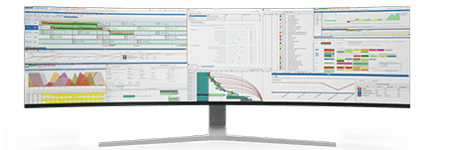Balancing Budget and Quality in Medical Manufacturing: The Role of Advanced Planning Tools
In the medical manufacturing industry, purchasing managers face a critical and nuanced challenge: ensuring that raw materials and components meet the highest quality standards while adhering to strict budgetary constraints. The stakes are high; poor-quality materials can lead to product failures, regulatory penalties, and risks to patient safety. Meanwhile, budget overruns can hinder profitability and strain organizational resources.
Achieving this delicate balance requires more than just traditional procurement strategies. It calls for advanced tools and seamless integration between supply chain management systems, like PlanetTogether, and enterprise resource planning (ERP) solutions such as SAP, Oracle, Microsoft Dynamics, Kinaxis, or Aveva. These integrations provide purchasing managers with the insights and control needed to make informed decisions that align quality and cost goals.

The High Stakes of Balancing Budget and Quality
In medical manufacturing, quality is non-negotiable. Regulatory requirements from organizations like the FDA and ISO mandate strict adherence to quality standards. Non-compliance can result in costly recalls, damaged reputation, and even legal action. Yet, the pressure to control costs is ever-present, particularly in an era of global competition and economic uncertainty.
For purchasing managers, these competing priorities can feel like walking a tightrope. On one side lies the risk of cutting costs at the expense of quality; on the other, the risk of overspending to meet quality demands. Advanced planning and scheduling tools, coupled with robust ERP systems, can help purchasing managers navigate this complexity.
![]()

PlanetTogether Integration: A Game-Changer for Procurement
PlanetTogether is an advanced planning and scheduling (APS) software designed to optimize production and supply chain operations. When integrated with ERP systems like SAP, Oracle, Microsoft Dynamics, Kinaxis, or Aveva, it enables seamless data sharing and enhanced decision-making capabilities.
For purchasing managers, this integration provides several key benefits:
Visibility Across the Supply Chain
PlanetTogether integration offers real-time visibility into inventory levels, supplier performance, and production schedules. This transparency helps purchasing managers anticipate material requirements and avoid last-minute purchases, which often come at a premium cost.
Supplier Performance Analysis
By analyzing supplier delivery times, defect rates, and compliance with quality standards, purchasing managers can make informed decisions about which suppliers to prioritize. The integration of PlanetTogether with ERP systems ensures that this data is accurate and easily accessible.
Dynamic Cost-Benefit Analysis
Integrated systems allow purchasing managers to evaluate the trade-offs between cost and quality dynamically. For instance, if a higher-cost supplier offers materials with a lower defect rate, the system can calculate the potential cost savings from reduced waste and rework.
Scenario Planning and Risk Management
PlanetTogether’s advanced planning capabilities enable purchasing managers to run “what-if” scenarios. For example, how would switching to a lower-cost supplier impact production timelines and product quality? This capability is invaluable for balancing budget and quality goals.
Strategies for Balancing Budget and Quality
While technology plays a critical role, achieving the right balance also requires strategic approaches. Here are some best practices for purchasing managers in medical manufacturing:
Establish Clear Quality Standards
Defining clear, measurable quality standards is essential. These standards should be documented in supplier contracts and regularly reviewed to ensure compliance. PlanetTogether’s integration with ERP systems allows purchasing managers to track supplier performance against these standards in real time.
Leverage Predictive Analytics
Predictive analytics, powered by integrated systems, can identify patterns and trends that impact procurement decisions. For example, if a supplier’s defect rate tends to increase during certain times of the year, purchasing managers can plan accordingly.
Optimize Inventory Management
Overstocking can tie up capital, while understocking can lead to production delays. PlanetTogether’s inventory optimization tools help purchasing managers strike the right balance by aligning inventory levels with production schedules and demand forecasts.
Foster Strong Supplier Relationships
Building collaborative relationships with suppliers can lead to better pricing and quality outcomes. Tools like PlanetTogether enable better communication and data sharing with suppliers, fostering transparency and trust.
Implement Continuous Improvement Programs
Continuous improvement is key to maintaining high quality at a reasonable cost. Integrated systems can help track the impact of improvement initiatives and identify new opportunities for cost savings and quality enhancements.
Balancing budget and quality is a perennial challenge for purchasing managers in medical manufacturing. However, with the right strategies and technologies, it is possible to achieve both objectives. Integration between PlanetTogether and ERP systems provides the visibility, analytics, and control needed to make informed procurement decisions that support organizational goals.
Purchasing managers can not only meet today’s challenges but also position their organizations for long-term success in a competitive and highly regulated industry. Are you ready to take your manufacturing operations to the next level? Contact us today to learn more about how PlanetTogether can help you achieve your goals and drive success in your industry.
Topics: PlanetTogether Software, Integrating PlanetTogether, Medical Manufacturing, Scenario Planning and Risk Management, Supplier Performance Analysis, Visibility Across the Supply Chain, Dynamic Cost-Benefit Analysis





















LEAVE A COMMENT